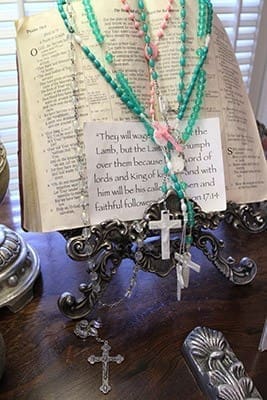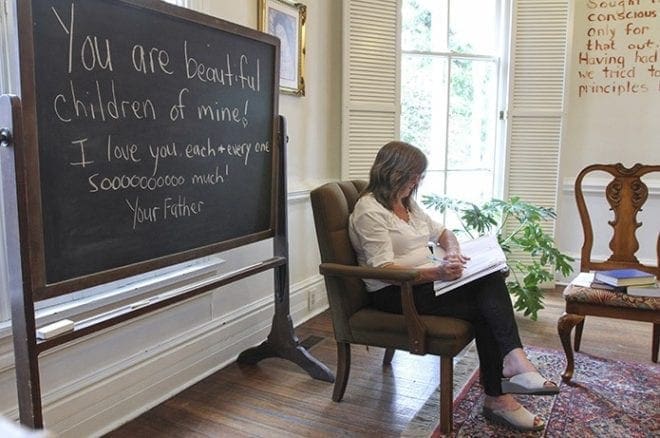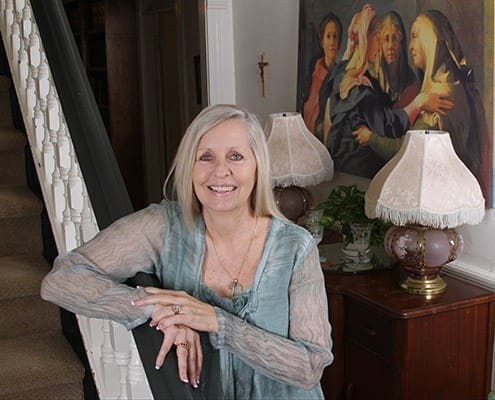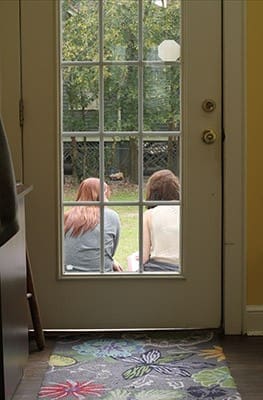Licensed professional counselor Andy Martin, standing, leads an afternoon group session at GraceWay Recovery Residence for Women in Albany, Ga. Since 2003 GraceWay has been a place for women trying to overcome substance or alcohol addiction and eating disorders. Photo By Michael Alexander
Albany
South Georgia refuge for women battling addiction brings light into darkness
By NICHOLE GOLDEN, Staff Writer | Published April 2, 2015
ALBANY—Different paths bring women to GraceWay Recovery Residence in Albany. Some want to be there. Others are there due to the intervention of loved ones or by court order. All are fighting for their lives against the hold of drug or alcohol addiction.
Situated on West Tift Avenue in Albany, the historic Denison House of 1896 is home to GraceWay. A panel of Our Lady of Guadalupe, placed in an upstairs window, seems to watch over all who come and go.
A white picket fence surrounds the dollhouse-like home, giving no clue to the struggles taking place within.
GraceWay’s residents are dealing with substance abuse, or eating and cutting disorders, and learning the tools needed to stay sober.

The Bible in the GraceWay chapel is open to the pages that show Psalm 79:1 through Psalm 81:3. Overlaying the pages are rosaries and a verse from Revelation 17:14, which falls under the heading, “Victory for the Lamb.” Photo By Michael Alexander
Although not affiliated with a particular denomination, GraceWay is a faith-based program founded by Catholics Debbie and Tim Mazur, parishioners of St. Teresa Church in Albany.
In recent months, an increasing number of women admitted to GraceWay are coming from Atlanta’s suburbs addicted to heroin.
The treatment program uses the 12-step methodology of Alcoholics Anonymous, which is spiritual in nature.
Debbie Mazur, who was court ordered to alcohol treatment 29 years ago, knows firsthand about recovery. “You never forget what it’s like to live in this darkness,” she said.
People who don’t struggle with addiction “can’t possibly understand the suffering,” she emphasized.
Mazur opened the nonprofit GraceWay in 2003 as a way of giving back and calls it the “toughest program in the state of Georgia.”
The essence of the program is that the best hope for sobriety comes from directing one’s life toward the divine.
“It’s a sacred place. There’s no place like it,” said Mazur. “He’s in charge here.”
For Regina, it’s a ‘stepping stone’ in recovery
It was the faith component of GraceWay that prompted Regina, an Atlanta Catholic, to select the program for initial treatment of alcoholism. A mother of two sons, Regina was admitted in October 2013 and stayed for 31 days.
“I got a DUI. It was my second one,” said Regina. Her rehabilitation was court-ordered.
In searching online for a program, Regina was also hoping to get “re-centered” with God.
Regina started drinking as a young person and after a period of sobriety had relapsed. She was craving a lot of quiet time for prayer, but also found a lot of work at GraceWay, where part of recovery for some residents is bread-making in its bakery.
“You do a lot of cleaning and cooking and a lot of meetings,” she said.
During less-structured time, she would pray the rosary.
Instead of the Serenity Prayer, the women would pray the Hail Mary each evening. At the time, Regina was the only Catholic at the residence.

A resident works on a morning assignment. It involved writing a letter to someone else going through substance abuse or alcoholism, in an effort to give them hope and to share their personal experiences of fighting off addiction and undergoing recovery. Photo By Michael Alexander
Regina’s stay at GraceWay was not a cure-all. “It was the first step,” she said. GraceWay was the “stepping stone” to finding AA meetings in Atlanta.
“I’m in recovery,” Regina said of the continual work.
GraceWay’s clients are women 18 and older. Some stay for a month of initial treatment, but can stay up to 18 months. Sober living apartments, The Way, are next door to the residence for long-term recovery.
“I liked the fact that it was all female,” Regina added.
She has found receiving the sacraments, including attending healing Masses, important to sobriety.
“I kind of wish there was more,” she said about the church’s role in ministering to those with addictions. “It’s mind, body and spirit. It’s not just a physical thing.”
A book by Cardinal Justin Rigali, “Let the Oppressed Go Free: Breaking the Bonds of Addiction,” has helped Regina.
“It’s a quick read,” said Regina. She believes the book is a good guide for Catholics dealing with addiction or for priests wanting to help parishioners with substance abuse in their families.
“It is about addiction from the Catholic perspective and the mercy the church offers,” explained Regina.
Family support has also been important. Regina has been very open with her children, saying a lot of mothers won’t admit they have a problem.
“They pray for me,” she said.
An epidemic of prescription drug abuse
Liz Dixon is executive director of GraceWay and sees many transformations in women working to achieve sobriety through spirituality.
“It’s a beautiful thing to witness,” said Dixon. “His restorative power is what transforms lives.”
According to Dixon, prescription drug abuse has morphed into a complete epidemic in Georgia. People start taking pain medicines prescribed to them, become addicted, and then turn to less expensive drugs on the street.
“It often ends up in a disease state. It robs them of their health,” she said.

Two residents prepare for the afternoon group session at GraceWay Recovery Residence for Women in Albany March 10. GraceWay, founded by a Catholic couple in 2003, can house up to 15 women “seeking long-term sobriety in an intense recovery program.”
She added, “It was a totally unmet need. That’s why there is a GraceWay.”
Sitting in her office across the street from the GraceWay residence, Dixon said the Catholic parish in Albany, and the community in general, has been supportive.
The Knights of Columbus helps GraceWay through local and state fundraising efforts.
Father Paulinus Okpala, parochial vicar at St. Teresa Church, comes weekly to offer spiritual guidance, as do other clergy in the community.
“Everyone over there has suffered some kind of major trauma,” said Dixon. The most common suggestion among the women is, “Have you prayed about it?”
Each day, the women have six hours of individual, group and peer-to-peer counseling sessions. They take part in exercise, nutrition classes, anger and stress management, and life skills classes.
Out of the 21 women treated at GraceWay’s residence in 2014, 19 remain sober. Thirteen of those women have marked one year of sobriety. One-third of the women qualified for indigent care.
Founder given Sister Ignatia Award
When walking through the front door of GraceWay, the quiet is striking. GraceWay’s chapel has a table of photos of women who died from addiction, a constant reminder of the ultimate consequence.
The home is consecrated to Our Lady of Grace.
A picture of Sister Mary Ignatia Gavin, a Sister of Charity of St. Augustine, hangs in the entryway.

Debbie Mazur, the founder and CEO of GraceWay Recovery Residence for Women in Albany, stands in the home’s foyer. In the background, right, is an image of the Visitation of Mary. The faith-based nonprofit opened its doors in 2003. Photo By Michael Alexander
Mazur modeled the program upon the work of Sister Ignatia, who with a co-founder of Alcoholics Anonymous, set up treatment wards for alcoholics in Ohio. She was key in the recognition of alcoholism as a disease and also helped implement Al-Anon programs for families of the addicted.
Mazur won the 2014 Sister Ignatia Gavin Award. She was the first layperson to receive the award in its 65-year history. The National Catholic Council on Addictions presents the annual award to individuals who have had a major impact in the field of addiction recovery.
Mazur recalls that after returning home from her own treatment years ago, she had little support.
“It was very hard,” she admitted.
Those who turn to substances “fear little things” like school and securing jobs. Alcohol and drugs become the escape.
While in treatment a volunteer mentor, nicknamed the “Cookie Lady” befriended Mazur.
Years later, the same woman attended the GraceWay open house and while talking they became aware of their previous connection.
“It was like God confirming. You can pull this off,” said Mazur.
Program is court-ordered for some
Amy J. of Macon was in RSAT, Residential Substance Abuse Treatment, for the second time when she realized she needed to call upon God for help. RSAT is for state prisoners, and Amy was just picking and choosing parts of recovery that appealed to her.

After the morning assignment and before lunch, residents enjoy some free time outdoors as they soak in a sunny March 10 day when temperatures reached into the low 80s. Photo By Michael Alexander
Awaiting a hearing on a probation violation date, Amy learned of GraceWay through a drug counselor.
“There’s no way they are going to accept me,” she remembers thinking.
But GraceWay did accept her and even held a bed for several weeks while she was in jail.
A Methodist, Amy did not grow up in an environment where drugs were the norm. She was involved in sports and began using drugs at 18 to try and fit in with others.
“I wanted to be accepted. It was my choice to do it,” she said.
She is working on a college degree, providing peer counseling at GraceWay and recently went back to RSAT to present a message of hope to the residents there.
“It’s just me doing the next, right thing,” she said.
Amy had nothing of her own when she first came to GraceWay.
“The gratitude has never left me,” she said.
Deacon says home brings light in darkness
Deacon Jay Dallas of St. Teresa Church in Albany serves on the board of directors for GraceWay Recovery.
The Mazurs are longtime friends of the deacon.
“I’ve long respected their commitment to help those in recovery from addictions and wanted to help in whatever ways I can. It is a grueling and difficult ministry,” said Deacon Dallas. “They need all the support we can give them.”
The deacon said considering the massive size of the drug epidemic and how it impacts nearly every American family, more attention should be offered to those in need.
“I believe there is a spiritual dimension to this illness. It is not only a medical problem,” said Deacon Dallas. “These folks need prayer, they need grace, and they need the love of God and people if they are going to succeed.”
He said the program accepts women with addictions from anywhere, and encourages the support of Atlanta area Catholics. “The universal family of God is the master idea in Catholic theology,” he emphasized.
Deacon Dallas has served as a volunteer at GraceWay since its inception.
“The goal is to help as many women as we can find lasting recovery from the hell of addictions,” he said.
Deacon Dallas said those who come for help, and the women who work there, operate daily in an atmosphere that few could tolerate for long.
“They represent us in this very poignant point in the battle between life and death, bringing light and healing into some very dark places,” he said.
‘Never stop trying’
As a nonprofit serving many indigent women, GraceWay has a variety of ways to raise needed funds. The Bread House is its for-profit bakery where wheat is milled into flour for healthy breads, cookies and energy bars. Some of the residents work there as part of recovery. Sales help sustain the addiction recovery program.

A GraceWay resident works at The Bread House & Granary, an all-natural bakery three miles from the recovery residence. On this particular afternoon she is scooping out oatmeal pecan and oatmeal pecan coconut cookie dough onto a baking tray for 24 cookies. Photo By Michael Alexander
Vickie W., a south Georgia resident, bakes bread daily. A mother of five sons, Vickie has been at GraceWay for more than 110 days. She is fighting an addiction to meth.
Her eyes brimming with tears, Vickie said she is grateful to be there.
“I’d be dead,” she said. “It’s a lot of hard work.”
Vickie had tried going to church back home after a relapse, but guilt made her feel like she didn’t belong. She now wants “to help other people.”
Two of her sons are in college, and one is planning on being an alcohol and drug counselor. “I’m very proud of them,” she said.
Back in Atlanta, Regina continues the work of recovery that began at GraceWay and urges others struggling not to let shame keep them from healing.
“Never, ever, ever stop trying,” she said. “Keep trying.”
To learn about GraceWay, go to www.gracewayrecovery.com. A red “Donate” tab provides a secure means of giving online.